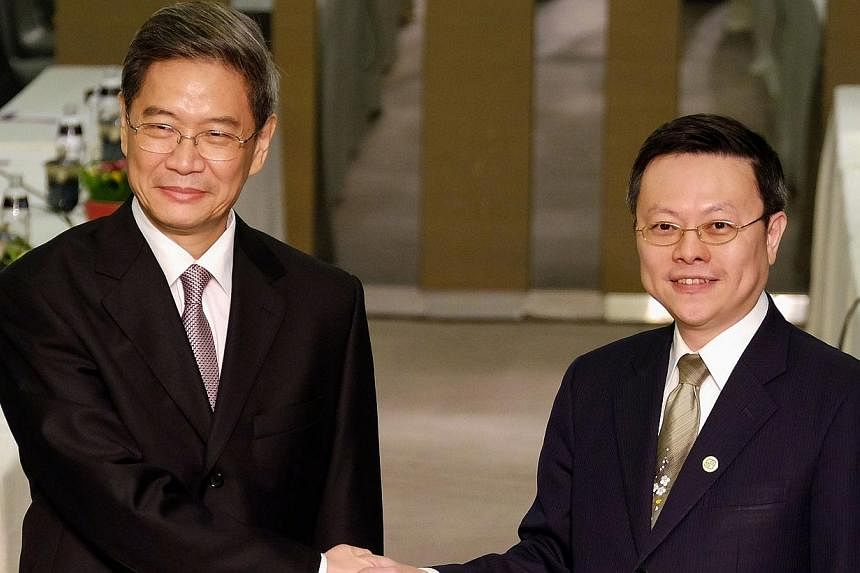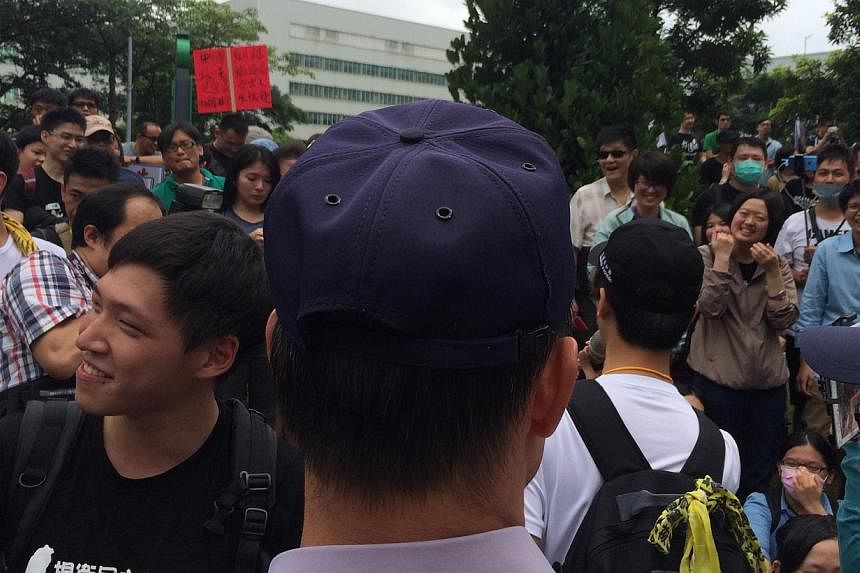TAOYUAN, Taiwan - There are problems plaguing cross-strait relations today, but they are not any more intractable than those in the past, said China's top official in charge of Taiwan affairs.
So long as both sides are "willing to work hard and with sincerity", the obstacles can be overcome, Mr Zhang Zhijun added, quoting a Chinese saying that "where there's a will, there is a way".
It was an upbeat spin on the challenges, even as Mr Zhang's visit to Taiwan - the first ever by the mainland's Taiwan Affairs Office (TAO) director - coincided with protests, heavy police security, and even an expulsion of pro-independence protesters from the two rooms they had booked at the hotel where he was speaking.
The Jiangsu native was making opening remarks ahead of a meeting on Wednesday afternoon with his Taiwan counterpart, Mainland Affairs Council (MAC) chairman Wang Yu-chi, at the Novotel hotel next to Taoyuan International Airport. Mr Zhang had arrived earlier in the day.
In welcoming Mr Zhang, Mr Wang noted that "many things had happened" in the past four months since their last meeting. They had met in February, when in a sign of warming ties, Mr Wang visited Nanjing and Shanghai, marking the first government-to-government contact between mainland China and Taiwan since the end of the Chinese civil war in 1949.
"There are different views among the Taiwanese on how cross-strait relations should proceed," Mr Wang said. "But there is also a level of consensus."
"Still, I think we will need to exchange our honest views on this at our meeting."
In March, student protesters stormed the legislature and occupied it for 23 days, in opposition to a cross-strait services trade pact. They also successfully rallied people in a massive protest, channelling the fears of small businesses and local workers about increasing competition from the mainland. Others worry that China's expanding economic clout facilitates its political influence spidering through the island.
One of Sunflower's student leaders Chen Wei-ting was outside the hotel on Wednesday, leading a small group of young activists, one of whom held up a placard inscribed with the words "Taiwan's future, we will decide ourselves".
A furore recently erupted when a TAO spokesman stated that Taiwan's future is up to "all Chinese people". Taiwan President Ma Ying-jeou retorted that it is up to the island's 23 million people instead.
Other protesters, numbering in the hundreds, ranged from members of the Falungong group which is banned in mainland China to those representing small businesses. Also present were those advocating reunification, with one man waving a giant flag of the People's Republic of China.
Still, ties between the two rivals on either side of the Taiwan Strait have come some way from the turbulence of the past decades, with China firing missiles into the waters off Taiwan at one point, in the mid-1990s. Former Chinese foreign minister Qian Qichen said in 1993 that China's strategy is to "blockade Taiwan diplomatically, to check Taiwan militarily and to drag Taiwan along economically".
In his remarks, Mr Wang called on Mr Zhang to "listen to the voices of the Taiwan people, understand their lifestyles and values, and respect the choices they make".
"In the process, there will inevitably be those with differing opinions. But I'm sure this will allow Mr Zhang to have a deeper impression of the real Taiwan."
In a whirlwind tour over four days, Mr Zhang will be visiting three cities - Taiwan's most populous city New Taipei City, southern port Kaohsiung where residents tend toward pro-independence views, and Taichung in central Taiwan, commonly viewed as a swing state.
He will skirt the capital, Taipei, due to political sensitivities.
On his visit, Mr Zhang will meet with a broad swathe of society, ranging from university students who often feel little cultural affinity with mainland China, to small and medium-sized businesses hurt by cheaper competitors from the mainland. He will also speak with opposition Democratic Progressive Party heavyweight Chen Chu, mayor of Kaohsiung and viewed as a moderate within the pro-independence party.
The charm offensive though had began right from the start. Upon his landing at the airport on Wednesday morning, he greeted the waiting media with "hello everybody", in the Taiwanese dialect which is similar to Hokkien.
"I have learnt a few words of the min nan dialect," he says. "My heart is sincere."
On the historic nature of his visit, he noted that his flight from Beijing took less than three hours. "But it took 65 years for us to come here."


